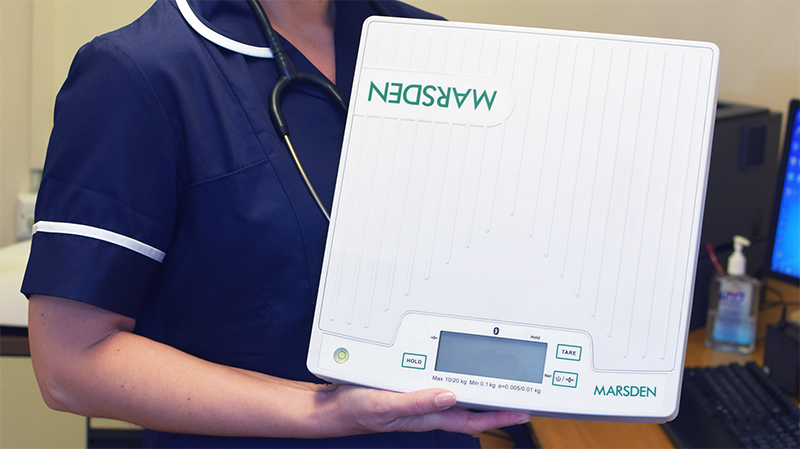3 reliable weighing scales GP surgeries cannot be without

Many GP surgeries opt for medical scales in every consulting room. While this means there’s always one to hand, it’s an expensive way to ensure a patient’s weight is always taken.
What often happens is that GP surgeries will then spend less per scale to ensure costs are kept down. Is this best solution to help GPs save money? Well, not really - because that means lots of less-than-reliable scales.
The National Legal Metrology Project report of 2015 recommended that GPs spent more money on fewer, more reliable medical weighing scales than lots of scales that are less reliable. This puts patient safety first (accurate weight readings, therefore better readings for diagnosing and prescribing treatment and medication) - but if you think this is at the expense of convenience, this blog post will set out to convince you otherwise.
Replace unreliable mechanical scales
If you’ve read the National Legal Metrology Project report, you’ll know that mechanical scales found in GP surgeries are usually Class III - and more likely to fail than their digital Class III counterparts.
The report states that the project found some analogue scales, when tested, were as much as 3kg out - a huge difference when you’re talking about administering treatment or prescribing drug dosages based on a person’s weight.
Not only that - but if cheaper mechanical weighing scales are more likely to fail, it can be a false economy: over time, you’re spending more money as you have to replace the scales more frequently.
How did decide on our three scales?
Every GP surgery will be different, have a different range of ages and different patient needs - not to mention anything from a couple to multiple consulting rooms. Therefore, not every single GP surgery will find our solution exactly fits their needs.
But for the average-sized surgery, the three Marsden scales here will adequately cover most need. Plus, since they are Class III Approved (and therefore legal for medical use) scales, they are likely to last longer and need replacing much less frequently.
Each weighing scale covers a specific use, location in the surgery and patient need. If you want to replace several mechanical scales with fewer, more reliable digital medical scales, these are the three that you cannot be without.
1. M-110 Column Scale with auto height measure
Or go for: M-100, our premium column scale
Once you have removed all the mechanical scales from every consulting room, we recommend instead employing a digital column scale in the waiting room. Column scales with automatic height measures are more convenient since the patient’s height will appear on the indicator as soon as the cursor is raised to the right height. The scale will then auto-calculate BMI.
Having a scale in reception that’s easy to use means a system could be set up whereby patients are weighed before seeing the doctor, speeding up time spent in the consulting room.
The M-110 has a 250kg capacity - with 100g accuracy - so suitable for most patients, including children. If you need a slightly higher capacity, the M-100 will weigh patients up to 300kg - and a 50g accuracy that makes it ideal for weighing children.
See the M-110 with digital height measure here.
2. M-550 GP Floor Scale
Or go for: M-545, our latest floor scale with BSA calculation
If you still feel you need a scale in consulting rooms, how about something lightweight than can be moved from room to room? The M-550 is purpose built for GP surgeries, and one of its most popular attributes is its wide weighing platform.
A 200g accuracy is enough for GP surgeries, and a 160kg capacity will suit most patients. Plus, Bluetooth technology means the scale is future proof should your surgery ever move to 100% paperless, wireless patient data recording in the future.
An alternative option to the M-550 is the M-545 - which is more robust, has a separate indicator and will also calculate a patient’s BSA.
3. M-300 Baby Scale
Or go for: M-400/M-410, portable baby scales with a weighing platform for toddlers too
When it comes to weighing babies, precision accuracy is essential. The Marsden M-300 Baby Scale weighs to 2g, meaning the very smallest weight changes can be detected. A 15kg capacity means it’s suitable for weighing babies even as they enter toddler age.
The M-300 is one of Marsden’s most popular medical scales, and one of the reasons is because it’s so easy to use. Just three buttons, as well as a Tare function, means getting a quick reading - handy if your young patient is a little upset - is no problem. It’s lightweight too, so you can easily move it from room to room, and Picostrain technology means battery power will last upto 600 hours.
Alternatively, the M-400 and M-410 baby scales have a removable baby tray for toddlers to stand on, and higher capacities.
What do you think?
Do you think our choice of weighing scales for GPs covers all needs, patients and situations?
To see more weighing scales suitable for GP surgeries, browse the Professional Medical Scale section of our website. If you have any questions about any Marsden scales, or service contracts for your scales, call 01709 364296 or contact us here.